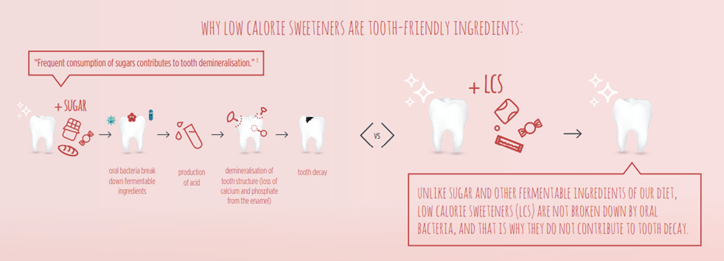The International Sweeteners Association Supports World Oral Health Day 2024
Brussels, 20th March 2024: The International Sweeteners Association (ISA) is happy to renew its support to World Oral Health Day (WOHD), organised every year by the FDI World Dental Federation to raise awareness about the joint efforts needed to help reduce the global burden of oral diseases.
The beneficial role of low/no calorie sweeteners in dental health is well established. While excess sugar consumption can cause dental caries1, low/no calorie sweeteners cannot be fermented by oral bacteria and do not contribute to tooth decay.2,3
This year WOHD is celebrated with the topic “A happy mouth is a happy body” and with the aim of promoting the multi-faceted nature of oral health, revealing its significant connections to our overall well-being4. The ISA campaign for WOHD 2024 aims to help improve oral health literacy for a happy mouth and to raise awareness on the role of a healthy, low-sugar diet in overall health.
A low sugar diet for a healthy mouth
Consuming too much sugar affects oral health by contributing to dental caries. On the contrary, low/no calorie sweeteners can contribute to good oral and dental health and to healthy food environments. 2,3 Reviewing the scientific data in 2011, the European Food Safety Authority (EFSA) also recognised that low/no calorie sweeteners help teeth retain the minerals they need to give them hardness and strength.5
Did you know?
Low/no calorie sweeteners are frequently used in sugar free chewing gums. Chewing sugar-free gum stimulates the production of saliva and has been shown to have important oral health benefits.6

A happy mouth is a happy body
Oral diseases are among the most common noncommunicable diseases (NCDs) worldwide, affecting an estimated 3.5 billion people.7 They are linked to other chronic NCDs, thus affecting our overall health.7According to the World Health Organization (WHO) Global Strategy on Oral Health, the importance of addressing oral health is part of the global commitment to prevent and control NCDs.
It is important to recall that oral diseases are largely preventable and can be treated in their early stages. Managing the four main risk factors for oral diseases – an unhealthy diet high in sugar, tobacco use, harmful alcohol consumption, and poor oral hygiene – is key for prevention and to protect our overall well-being.4
Engage in the conversation around World Oral Health Day 2024 on social media by using the dedicated hashtags: #ISA4WOHD, #WOHD24 and #HappyMouth.
More information:
- In our factsheet ‘Low/no calorie sweeteners and their beneficial role in oral health’
- Infographic ‘Low/no calorie sweeteners in dental health’
- Chapter dedicated to oral health of the recently updated the ISA booklet “Low/no calorie sweeteners: Role and Benefits”, a guide to the science of low/no calorie sweeteners.
Media enquiries: media@sweeteners.org

